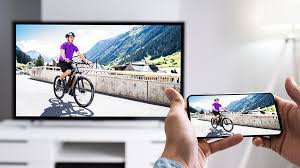Dear Ms. Smartphone: Is there a chance that my refrigerator, my TV, and my phone are talking to each other? They are all the same brand (begins with a S, ends with a G). I’ve started to see ads on my phone and similar ones on my TV for a car I would like to buy. I wonder if they overheard my conversations about it with friends and if there is any digital privacy? Jared, San Francisco
Dear Jared: You could ask your appliances and phone directly, but of course they will respond with radio silence! In these early days of the Internet of Things (IoT) connected appliances often seem more like IDIOTS. But technology moves on – you might want to ask the same question at chat.openai.com,
Although I am not aware that the phone and TV (plus fridge) pass information back and forth, it is not implausible. Those privacy statements we gloss over do mention sharing information in-house among marketing affiliates. Your fridge, your TV, and your smartphone are all connected by your WiFi IP address.
What’s Listening?
But first, look for snoops outside your ‘S’ family of appliances. The first place to check for digital privacy would be with a virtual assistant, like the Alexa or Echo. They are also connected to your router and would be privy to your search terms or even some of your conversations. It’s important to look at their privacy controls- particularly when you first set them up (more on that later).
Still, the most likely explanation is that none of the devices were dropping into or harvesting your conversation. Vehicle manufacturers push year-end close-out ads so what you are experiencing is just a coincidence. To convince yourself, do this little thought experiment. Imagine a product or experience totally out of your wheelhouse, something that you would never talk about with friends. Say you decide to take vitamins for hair loss or plan a destination wedding. Then engage in some casual conversations with your friends on this topic, and make sure you are in the vicinity of your phone, your TV, and the fridge.
Privacy Lock-Down:
But, if you still think that your phone or TV are conspiring to sell you things, what steps should you take to lock them down? Let’s start with the TV, since the average American spends about 3.5 hours a day watching it. When it comes to setting up a new TV you don’t want to tear open the cardboard box, discard the styrofoam packaging, plug the TV into the wall socket, and start clicking in a matter of minutes. It’s vital to study the setup directions and treat them like gospel. There is a setting for TV’s called ACR- it stands for Automatic Content Recognition. It tracks the channels you prefer, how long you watch them, and the commercials you see. Unless you opt out, it will send this date to the manufacturer or one of its business partners. The Washington Post reports that one brand, the Vizio, captures a fingerprint of what’s on the screen once per second and Samsung TV was fined for similar breaches.
Meanwhile, your Android phone could also be collecting data. The voice assistant on the phone will be activated when it hears the wake words, “ Hi Bixby.” (That’s the name of the Samsung voice assistant, similar to Apple Siri). There are numerous ways to activate Bixby, and it’s worthwhile reading about them to make sure that you have not accidentally opted in or are continuously running Bixby in the background. Like the TV, there are critical decisions to make when you originally set up the smartphone. It’s a good idea to resist the temptation to fling open the box, discard the wrappings, and start tapping without carefully reading the setup screens.
Advertising IDs:
Yet another way that your Android phone might track you is through a unique identifier called the Advertising ID. It allows marketers to see what a user is doing across all apps, and hence, it can follow your car-searches. A setting to opt out on the Android phone will not be fully implemented until 2023 or later. That’s unfortunate since about three-quarters of Apple users, who now have this option choose not to be tracked.
It’s different in TV land. The Washington Post article says that 90 percent of Vizio owners (probably other brands too) opt in to the pre-mentioned ACR. People are not accustomed to the idea that their TV is also a listening two-way device. Digital privacy for phones gets a lot more attention.
Say Cheese:
Finally, you may not have considered one more high-tech feature that your fridge, the phone, and the TV all have in common. It’s a camera. On the TV the camera is intended to facilitate with video calling or facial recognition. Inside your fridge, a camera lets you view the food stock remotely using a smartphone app. If you are concerned, see if there is a way to deactivate the cameras or place a privacy screen over them.
Since many of us will be getting new devices and setting them up this holiday, it’s a good idea to do that S-L-O-W-L-Y. Those online videos that depict the joys of unboxing are entertaining to watch. But it would be time better spent actively setting up devices and decision making at each step.


Leave a Reply
You must be logged in to post a comment.